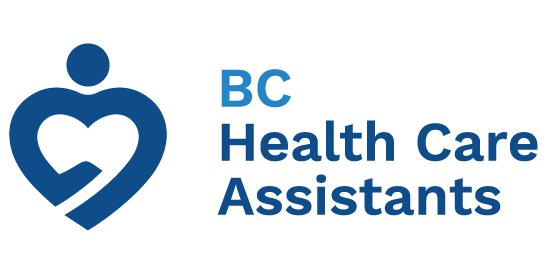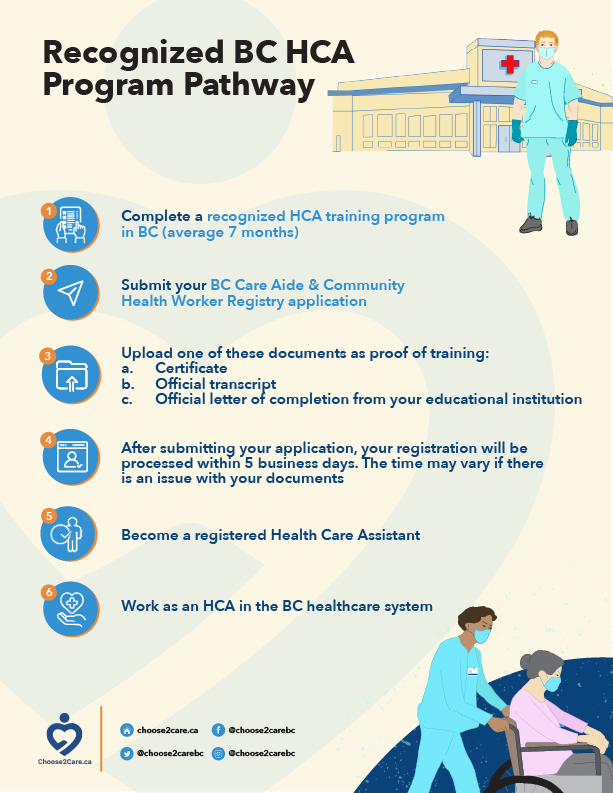Youth


If you are interested in a healthcare career, consider entering the field by becoming a Health Care Assistant (HCA).
Health Care Assistant training program lengths vary from school to school, but the average time range is seven months. Most HCAs graduate and register to start working in less than a year.
If you’re ready to take the first step toward becoming a Health Care Assistant, check out these recognized HCA training programs in British Columbia.
Pathways to Registration
Browse the recognized post-secondary institutions in BC offering the Health Care Assistant program.
Dual Credit Options
Did you know that you can work toward an HCA credential while you are still in high school? If you consider enrolling in a recognized HCA program after graduation, consider getting a head start on your HCA education through a dual credit option. You will take post-secondary courses tuition-free and receive credit on your high school and college transcripts through a dual credit option.
To learn more about dual credit options, talk to your high school career counsellor.
For more information about dual credit options currently being offered in your community, browse the links below.
BC Post-Secondary Institutions with HCA Dual Credit Options:
*Please note this list is not exhaustive.
Career Laddering Opportunities for Health Care Assistants
If you are interested in a career in nursing, there are many benefits to starting your career as a Health Care Assistant. While many nursing programs in BC have waitlists, many HCA programs across the province currently have spaces available. Your HCA education could be a gateway to other healthcare careers and enable you to gain valuable work experience, good wages and benefits along the way.
After training as an HCA, if you wish to advance your studies, you can put your prior learning as an HCA toward other post-secondary programs, such as Nursing Access and Bridging Programs. These programs support a move from being an HCA transitioning to a Licensed Practical Nurse, and from a Licensed Practical Nurse to a Registered Nurse. These programs are designed for individuals with HCA education and experience to receive their nursing credentials more quickly.

Financial Supports
If you need financial assistance to enroll in an HCA program, there are options available. Please contact an HCA education program about available financial supports, or follow the links for more information about loans, scholarships, bursaries, and more:
*Please note this list is not exhaustive.
- StudentAid BC
- Canada Student Grants and Loans
- WorkBC
- Progressive Intercultural Community Services Society (PICS) offers fully-funded HCA programs for individuals on EI
- BC Housing – Education Awards Program
- North Island College – Evergreen Club Bursary
- Northern Lights College – Health Care Assistant Bursary
Employment
Participating in a job shadow placement can help you gain knowledge about the role of a Health Care Assistant. These unpaid placements allow you to observe an HCA and learn about specific responsibilities required for the job. This is an excellent opportunity to find out if the career choice as an HCA is right for you.
- Experience a career of interest before enrolling in an educational program
- Understand the important and rewarding work of an HCA
- Observe and appreciate how roles in health care support one another
- Enjoy the opportunity to ask questions of an expert
As many employers do not post job shadow placements, talk to your high school career counsellor for information on how you can explore this option.
If you’re looking for a career that will provide you with job satisfaction and security while also impacting the lives of others, consider a job as a Health Care Assistant.
Browse employment opportunities as Health Care Assistants, in both public and private healthcare sectors on our Employment page.

Resources for Parents, Counsellors, and Educators
The WorkBC Parents’ and Career Counsellors Guide provides information, guidelines, and resources to support youth on their journey toward a career in health care.
The Ministry of Education’s Career Zone Guide provides background information on the healthcare sector in BC, and outlines how employers and institutions can work together to help support and prepare students for a career as a Health Care Assistant.
The Career Compass online tool helps youth explore potential healthcare career options. They can take a career quiz, browse careers, and explore job options in different regions of BC. Use Career Compass learning activities to help students in Grades 9 and 10 to explore career options, and Grade 11 students reassess their career plans.

Youth FAQ
1. How much time does it take to complete an HCA program in BC?
Health Care Assistant training varies from school to school, but the average duration is seven months. Most HCAs graduate, register, and start working in less than a year.
2. Where do I search for available HCA programs to enroll?
To become a registered Health Care Assistant in British Columbia, you must complete a recognized Health Care Assistant program using the provincial curriculum. Click here to view a list of recognized health care assistant education programs in British Columbia.
3. Are there dual credit options that offer Health Care Assistant training?
Yes, dual credit options are offered in some high schools throughout BC, allowing you to work toward an HCA credential while still in high school. Dual credit experiences enable you to enroll in post-secondary courses and earn credits toward your high school diploma and post-secondary credits at the same time. Check out the Dual Credit Option section on this page for more information.
4. What financial supports are available to help me pay for the HCA program?
If you need financial assistance to enroll in an HCA program, there are options available. Please contact an HCA education program about available financial supports, or read about loans, scholarships, bursaries, and more in the Financial Supports section on this page.
5. What other professions in healthcare could I move into after HCA?
Entering the healthcare field as an HCA can open up more opportunities. After training as an HCA, if you wish to advance your studies, you can put your prior learning as an HCA toward other post-secondary programs, such as Nursing Access and Bridging Programs, which support a move from being an HCA to a Licensed Practical Nurse, and from a Licensed Practical Nurse to a Registered Nurse.
Choose a Career in Providing Care
Site Map
Privacy Policy
Terms Of Use
Contact Us

